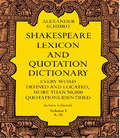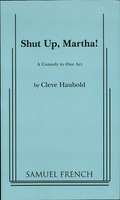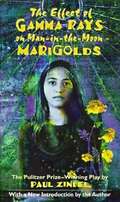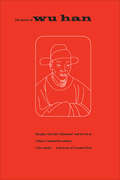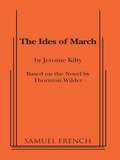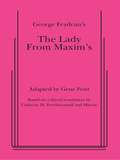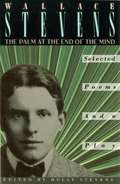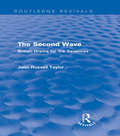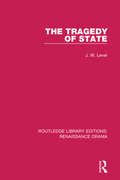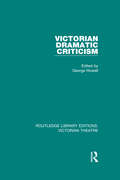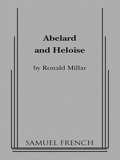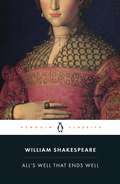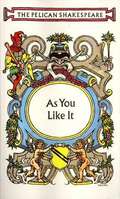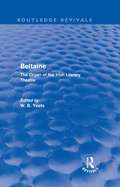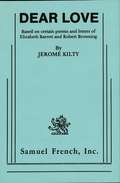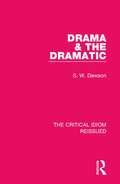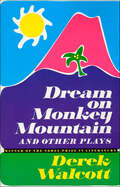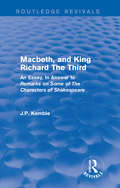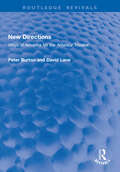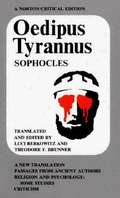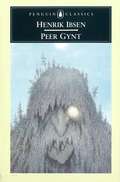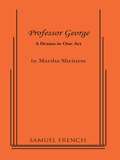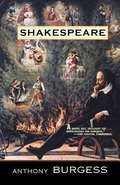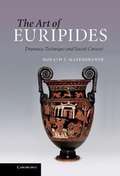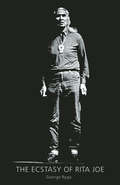- Table View
- List View
Shakespeare Lexicon and Quotation Dictionary: A Complete Dictionary Of All The English Words, Phrases, And Constructions In The Works Of The Poet (Third Edition)
by Alexander SchmidtIn more than 300 years of Shakespearean scholarship, only one book, the famous Shakespeare Lexicon and Quotation Dictionary, has investigated the meaning of every word that Shakespeare wrote. The lifetime work of Professor Alexander Schmidt of Königsberg, this book has long been the indispensable companion for every person seriously interested in Shakespeare, Renaissance poetry and prose of any sort, or English literature. It is really two important books in one. <p><p> Schmidt’s set contains every single word that Shakespeare used, not simply words that have changed their meaning since the seventeenth century, but every word in all the accepted plays and the poems. Covering both quartos and folios, it carefully distinguishes between shades of meaning for each word and provides exact definitions, plus governing phrases and locations, down to the numbered line of the Cambridge edition of Shakespeare. There is no other word dictionary comparable to this work. <p> Even more useful to the general reader, however, is the incredible wealth of exact quotations. Arranged under the words of the quotation itself (hence no need to consult confusing subject classifications) are more than 50,000 exact quotations. Each is precisely located, so that you can easily refer back to the plays or poems themselves, if you wish context.Other features helpful to the scholar are appendixes on basic grammatical observations, a glossary of provincialisms, a list of words and sentences taken from foreign languages, a list of words that form the latter part of word-combinations. This third edition features a supplement with new findings.
Shut Up, Martha!
by Cleve HauboldComedy / 3m, 2f / Interior / On a stormy night, a mysterious cloaked figure appears in Benjamin Franklin's print shop to insist Ben print a letter "to save the country." The fun and confusion build until the visitor produces a basket of chocolates and casts off her disguise to reveal herself as Martha Washington. Wild eyed Martha plies the wary Ben with promises and peanut brittle to persuade him to publish her note in which she sees a Tory behind every tree. Ben tries to calm Martha, but she becomes a whirlwind of confusion, when George Washington himself angrily arrives to drag Martha back to Mount Vernon. A mad historical romp which shows how history can repeat itself.
The Effect of Gamma Rays on Man-in-the-Moon Marigolds: A Drama in Two Acts
by Paul ZindelBeatrice was a mother...and the embittered ringmaster of the circus Hunsdorfer featuring three generations of crazy ladies living under the sloppiest big top on earth. Nanny was no problem. She sat and stared and stayed silent as a venerable vegetable should. Ruth was half-mad and easily bought with an occasional cigarette. But how is the world would Beatrice control Tillie--keeper of rabbits, dreamer of atoms, true believer in life, hope, and the effect of gamma rays on man-in-the-moon marigolds...<P><P> Pulitzer Prize Winner
The Heresy of Wu Han: His play 'Hai Jui's Dismissal' and its role in China's Cultural Revolution
by Clive AnsleyAt the centre of China's Cultural Revolution in its first stages stands the ambiguous figure of Wu Han. Occupying until the mid-sixties a favoured position among the intellectual elite of the People's Republic, he was the eighth-ranking figure in the Chinese Communist Party, and his Peking Opera Hai Jui's Dismissal was performed all over China. Gradually it became apparent that Wu Han was using Hai Jui to lampoon Chairman Mao Tse-tung and the core policies of the CPP. Other dissidents began to pen articles and plays on similar themes. For several years Mao chafed under these literary attacks, but in late 1965 he retaliated. A sudden, scathing attack on Wu Han and his play by an obscure newspaper editor marked the beginning of the Cultural Revolution, a cataclysm in which the Party leadership was decimated while Mao regained full supremacy. This volume presents the first translation of Wu Han's plays and helps to clarify the obscure origins of a national phenomenon that was at once intellectual, social, and political.
The Ides of March: A Novel (Modern Classics Ser.)
by Jerome KiltyHistory / 9m, 6f, extras / Platform stage / The action spans the year before and up to Caesar's assassination, introducing us to Cleopatra on her visit to Rome. Caesar has given some strict proscriptions; but all the same he falls in love with her again. This infuriates a patrician woman of Rome. Her attempts to have Antony seduce Cleopatra pay off when Caesar discovers them together. He is preparing to leave on a tour the Ides of March, but that morning he receives twenty-three stab wounds, and dies untended on the street.
The Lady from Maxim's
by George FeydeauFarce / 5m, 4f, extras / Unit set A normally sober doctor awakens to find that he brought two things home from Maxim's last night: a hangover and a lady of the evening. His wife is diverted from discovering the tart by one of her famous visitations from a popular saint. The doctor's uncle returns after a long army tour in Africa and promptly mistakes the lady from Maxim's for his nephew's wife. Uncle's immediate business is marrying off a niece to a young soldier who turns out to be the true lover of the lady from Maxim's. Everybody is invited to the ceremony at the uncle's chateau where all courses collide. The master of bedroom farce unravels the confusion happily and innocently. The New York production featured witty original songs scored for piano which may be used at the producer's discretion. . "A well made funny bedroom farce." N.Y. Post
The Palm at the End of the Mind: Selected Poems and a Play
by Wallace Stevens Holly StevensA collection that all the major long poems and sequences, and every shorter poem of lasting value in Stevens' career. Edited by Holly Stevens, it includes some poems not printed in his earlier Collected Works.From the Trade Paperback edition.
The Second Wave: British Drama for the Seventies (Routledge Revivals)
by John Russell TaylorIn the 1970s the revolution that had swept the British theatre in the 1950s had already become accepted as the new establishment. Areas that had been previously regarded as remote ideals - including permanent repertory companies, a lively provincial theatre and an extensive spread of avant-garde and fringe theatrical activities - were now considered commonplace. In this title, first published in 1971, John Russell Taylor assesses the prospects of the British theatre at the start of the 1970s and indicates its points of weakness and its strengths. In this context are placed the key figures among the Second Wave of dramatists, and detailed critical commentaries on the work of writers such as David Mercer, Tom Stoppard and Peter Terson. This is an indispensable introduction for any student with an interest in the history and development of the British theatre and the people who have played instrumental roles in this.
The Tragedy of State (Routledge Library Editions: Renaissance Drama Ser.)
by J. W. LeverThe domination of the state over the lives of individuals is, arguably, a problem of the present-day world. In this book, first published in 1971, the author finds essentially the same problem in Jacobean tragedy in the shape it assumed during the rise of the first European nation-states. The English dramatists of the early seventeenth century a
Victorian Dramatic Criticism (Routledge Library Editions: Victorian Theatre #5)
by George RowellOriginally published in 1971. The Victorian Age was one of popular theatre and increasingly popular journalism. One manifestation of this journalism was the emergence of the dramatic critic from the anonymity and brevity which had previously characterized periodical treatment of the theatre. If Victorian theatre is regarded as existing essentially thirty years before Victoria acceded and continuing until the outbreak of war in 1914, the names of Lamb, Leigh Hunt and Hazlitt at one end, and of Beerbohm and MacCarthy at the other, can be added to a list that includes Lewes, James, Archer, Walkley, Shaw and Montague. All these writers, and others less famous, are represented in this selection. By selecting the articles on the basis of the play in performance, rather than the play as literature, and by arranging them according to various aspects of the theatrical process, this book builds up a skilful and lively picture of the contemporary theatre at work, in the words of its leading commentators. The anthology successfully conveys the qualities of abundance and vitality to characteristic of Victorian theatre.
Abelard and Heloise
by Helen WaddellHistorical Drama \ 12m, 9f \ Single Set \ One of the greatest love stories of all time, this play was inspired by Helen Waddell's Peter Abelard and the letters of the 12th century lovers: a monastic scholar and poet and the innocent girl who came to adore him. Abelard loses his heart and his reason to Heloise, has a child by her and, in violation of his vows, enters into a secret marriage. Heloise's vengeful uncle alerts the ecclesiastical authorities. The lovers are separated and Abelard is castrated. She enters a nunnery and he a monastery. They meet again years later when he turns over to her, as abbess, a community he founded at their parting. \ "Will please people who like tragedy with their love and wit with their history." - The New York Times
All's Well That Ends Well
by William Shakespeare'Shakespeare was not of an age, but for all time' Ben Jonson A poor doctor's daughter cures the King of France and, in return, is promised marriage to any nobleman she wishes. But the proud young count she chooses refuses to consummate the marriage and flees to Florence - after setting her a seemingly impossible task. Depicting the triumph of trickery over youthful arrogance, All's Well That Ends Well is among Shakespeare's darkest romantic comedies, yet it remains a powerful tribute to the strength of love.Used and Recommended by the National TheatreGeneral Editor Stanley WellsEdited by Barbara EverettIntroduction by Janette Dillon
As You Like It
by William Shakespeare Ralph SargeantThis wisely funny comedy, which contains some of Shakespeare's loveliest poetry, contrasts a country's world of envy and rivalry with a forest's world of compassion and harmony. In the Forest of Arden, the banished young heroine, Rosalind, disguised as a gentleman farmer, encounters an extraordinary assemblage of characters, including a fool, a malcontent traveler, her own banished father, and the banished young man she loves. Romantic happiness triumphs, even as we laugh at the excesses of love, at the ways of court and countryside, indeed, at everything, in this masterpiece of comic writing.
Beltaine: The Organ of the Irish Literary Theatre (Routledge Revivals)
by W. B. YeatsFirst published in 1970, this book is a faithful representation of the original edition of Beltaine, a literary magazine edited by W. B. Yeats from May 1899 to April 1900. Beltaine was the first of several magazines of the Irish Literary Theatre (later to become The Abbey Theatre) in which Yeats’s editorial role was of utmost importance. It was an occasional publication and focused on promoting current works of Irish playwrights whilst challenging those of their English opponents. The magazine mainly consists of a series of essays on the theatre in Dublin, and supplementing these are explanations and discussions of new plays, excerpts from which are often included. This book will be of interest to those with an interest in Yeats, early nineteenth-century literature, and Irish theatre.
Dear Love
by Jerome KiltyBiography / 1m, 1f / As the hit play Dear Liar drew on the life-long correspondence of Bernard Shaw and Mrs. Patrick Campbell, author Jerome Kilty uses the poems and letters of Elizabeth Barrett and Robert Browning, to present this compelling portrait of a couple whose words and love are legendary. First corresponding via letters, when Elizabeth thinks of Browning as merely "an acquaintance", his poetry moves her so deeply they eventually meet. Chastised by her stern father and guilty over the death of her beloved brother, Elizabeth is bereft and isolated. Browning begins to court her and she is finally persuaded to marry and accompany him to Italy, where their love might grow away from the over-watchful eyes of her antagonistic, Victorian father. Elizabeth Barrett loved Robert Browning beyond all enduring; Dear Love recounts the ways.
Drama & the Dramatic (The Critical Idiom Reissued #10)
by S. W. DawsonFirst published in 1970, this book explores drama as literature and provides critical overviews of different aspects of drama and the dramatic. It first asks what a play is, before going on to examine dramatic language, action and tension, dramatic irony, characters and drama’s relationship with modern criticism and the novel. This book will be a valuable resource to those studying drama and English literature.
Dream on Monkey Mountain and Other Plays
by Derek WalcottOn a Caribbean island, the morning after a full moon, Felix Hobain tears through the market in a drunken rage. Taken away to sober up in jail, all that night he is gripped by hallucinations: the impoverished hermit believes he has become a healer, walking from village to village, tending to the sick, waiting for a sign from God. In this dream, his one companion, Moustique, wants to exploit his power. Moustique decides to impersonate a prophet himself, ignoring a coffin-maker who warns him he will die and enraging the people of the island. Hobain, half-awake in his desolate jail cell, terrorized by the specter of his friend's corruption, clings to his visionary quest. He will try to transform himself; to heal Moustique, his jailer, and his jail-mates; and to be a leader for his people. Dream on Monkey Mountain was awarded the 1971 Obie Award for a Distinguished Foreign Play when it was first presented in New York, and Edith Oliver, writing in The New Yorker, called it "a masterpiece."Three of Derek's Walcott's most popular short plays are also included in this volume: Ti-Jean and His Brothers; Malcochon, or The Six in the Rain; and The Sea at Dauphin. In an expansive introductory essay, "What the Twilight Says," the playwright explains his founding of the seminal dramatic company where these works were first performed, the Trinidad Theatre Workshop.First published in 1970, Dream on Monkey Mountain and Other Plays is an essential part of Walcott's vast and important body of work.
Macbeth, and King Richard The Third: An Essay, In Answer to Remarks on Some of The Characters of Shakespeare (Routledge Revivals)
by J.P. KembleJohn Philip Kemble was an ambitious and successful stage actor in London, perhaps most well-known for his turn as Shakespeare’s Macbeth. Kemble passionately disagreed with the posthumous work of Thomas Watley, Remarks on Some of the Characters of Shakespeare (1785), particularly Watley’s representations of some of Shakespeare’s greatest villains, Richard III and Macbeth. This title, first published in 1786 (this reprint of the second edition first published in 1970), presents Kemble’s nuanced criticisms of the characters leaving the impression that the villainies of Macbeth and Richard III are indeed similar. A historically important literary reaction, this title will be of interest to students of English literature and literary criticism.
New Directions: Ways of Advance for the Amateur Theatre (Routledge Revivals)
by Peter Burton David LaneNew Directions (1970) is a handbook for amateur dramatists packed with ideas and practical advice on production, choosing plays, improvisation, make-up, costumes, street drama, scenery and documentaries. The authors offer choices of solutions to problems, and suggest ways to experiment and improvise.
Oedipus Tyrannus
by Sophocles Theodore F. Brunner Luci BerkowitzThe text is accompanied by a wealth of carefully chosen background materials and essays. "Passages from Ancient Authors" includes selections from Homer's Odyssey, Thucydides' account of the plague, and Euripedes' Phoenissae. The best of ancient and modern criticism is represented, encouraging discussion from psychological, religious, anthropological, dramatic, and literary perspectives. Under the heading "Religion and Psychology" are included writings on the Oedipus myth by Martin P. Nilsson, Meyer Fortes, Gordon M. Kirkwood, Thalia Phillies Feldman, and Sigmund Freud. The authors of the selections in "Criticism" are Aristotle, C. M. Bowra, R. C. Jebb, S. M. Adams, A. J. A. Waldock, Albin Lesky, Werner Jaeger, Friedrich Nietzsche, John Jones, D. W. Lucas, Bernard M. W. Knox, Cedric H. Whitman, Richmond Lattimore, Robert Cohen, Francis Fergusson, and H. D. F. Kitto. The special question of Oedipus's guilt or innocence is addressed in essays by J. T. Sheppard, Laszlo Versenyi, P. H. Vellacott, E. R. Dodds, Thomas Gould, and Philip Wheelwright.
Peer Gynt: A Dramatic Poem (Classics)
by Henrik Ibsen Peter WattsThis high-spirited poetical fantasy, based on Norwegian folklore, is the story of an irresponsible, lovable hero. After its publication, Ibsen abandoned the verse form for more realistic prose plays.
Professor George
by Marsha SheinessWhat seems to be an ordinary situation is turned inside out to provide a fascinating, near bizarre experience. Five college students are confronted with "unheard of" demands and challenges from Professor George who'll try almost anything to free students from habits limiting a person's potential. The professor shows a twig to them and says. "There's someone in the twig waiting for us to find him or her." Later, it's understood the search for the twig's symbolic person is really the search for the unique in each individual.
Shakespeare
by Anthony BurgessLike Burgess's early novel, Nothing Like the Sun: A Story of Shakespeare's Love-Life, this equally delightful factual treatment of what we know of the Bard combines Burgess's stimulating erudition and his well-informed imagination. The result is at once a speculative biography, a theatrical history, and a re-creation of the Elizabethan age. Whether a vivid retracing of the evolution Elizabethan theater, a bravura reconstruction of the first performance of Hamlet, an infiltration of the intricacies of the court of the Virgin Queen, or an elegy on the era's end with the distrastrous Essex Rebellion, Burgess -- author of the classic A Clockwork Orange -- sets the stage for England's most glorious time and turns the spotlight on the figure of William Shakespeare. <p><p>"Animated by affection and an understanding of the creative imagination that only a creative writer can bring to bear."—Atlantic Monthly<p> "A smooth-flowing narrative, often enlivened by Anthony Burgess's Joycean appetite for linguistic fantasy."—Economist<p> "Bright, racy...knowledgeable and humorous, alternately sensible and quirky."—Terry Eagleton, Commonweal <p>"Burgess's wonderfully well-stocked mind and essentially wayward spirits are just right for summoning up an apparition of the Bard...."—Daily Telegraph
The Art of Euripides: Dramatic Technique and Social Context
by Donald J. MastronardeIn this book Professor Mastronarde draws on the seventeen surviving tragedies of Euripides, as well as the fragmentary remains of his lost plays, to explore key topics in the interpretation of the plays. It investigates their relation to the Greek poetic tradition and to the social and political structures of their original setting, aiming both to be attentive to the great variety of the corpus and to identify commonalities across it. In examining such topics as genre, structural strategies, the chorus, the gods, rhetoric, and the portrayal of women and men, this study highlights the ways in which audience responses are manipulated through the use of plot structures and the multiplicity of viewpoints expressed. It argues that the dramas of Euripides, through their dramatic technique, pose a strong challenge to simple formulations of norms, to the reading of consistent human character, and to the quest for certainty and closure.
The Ecstasy of Rita Joe
by George RygaRita Joe is a Native girl who leaves the reservation for the city, only to die on skid row as a victim of white men's violence and paternalistic attitudes towards First Nations peoples. As perhaps the best-known contemporary Canadian play and a poetic drama of enormous theatrical power, The Ecstasy of Rita Joe had a major influence in awakening consciousness to the "Indian problem" both in whites and Natives themselves.Cast of five women and 15 men. With a preface by Chief Dan George.The Ecstasy of Rita Joe premiered November 23, 1967 at the Vancouver Playhouse.
